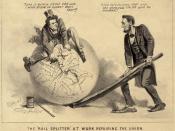In the aftermath of the civil war many Americans in the south were impoverished due to the loss of their homes and lifestyles. Freed slaves had nowhere to go, much less the money to start their own lives after generations of enslavement. Wealthy plantation owners were reduced to nothing, their homes and farmland destroyed by armies. Food, clothing, and sanitation supplies were scarce; more people were dying from illness and hunger than in the actual fighting. The words of a former plantation owner William Gilmore Simms portray these hard times, "...my house, newly rebuilt, has been destroyed by Sherman's Army; my stables, carriage house, barns, gin house, machine and threshing houses; in short every building of any value; my mules, horses, cattle driven off and carried away, or butchered. My wagons, ploughs, implements, all destroyed; and I am here, temporarily destitute, without money to spare to telegraph you." (Simms pg.
3) The harsh conditions led to the era known as Reconstruction, where the lenient policies of Andrew Johnson during Presidential Reconstruction led to congress taking matters into their hands, the Congressional or Radical Reconstruction until the presidential election of 1876 that ended the reconstruction period.
Presidential Reconstruction began with President Abraham Lincoln, who issued the Proclamation of Amnesty and Reconstruction to aid the southerners in 1963, two years before the formal surrender of the Confederacy, after huge union victories at Gettysburg and Vicksburg. This policy outlined Lincoln's Ten Percent Plan, which stated that a state could not be admitted to the union until ten percent of its voters swore allegiance to the Union. A full pardon was granted to all Southerners except high ranking military and government officials upon readmittance to the Union. President Lincoln wanted the Reconstruction process to be quick and easy, but the radical republicans in congress...


